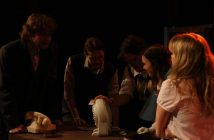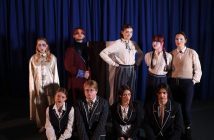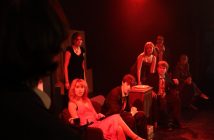A clever and intriguing detective story based on a historical event. Told from the perspective of the now-deceased historical figures it was tense, clever and fascinating to watch the characters' work out what had happened as new information was revealed.
-
8
Copenhagen is an intriguing and intelligent mystery play where the characters are the detectives. They are all involved in uncovering ‘the truth’ behind the historic meeting between physicists Niels Bohr and Werner Heisenberg in Copenhagen in 1941.
Though, perhaps it was Margrethe Bohr (Haydn Gwynne) who uncovered most, including many of the big reveals at the end. I loved that element – it was nice to see the female character, the non-scientist (though she typed all her husband’s papers), do lots of the detective work, especially in a period piece.
The event is rooted in history – something that, as a history student, I was a big fan of. As I said, it was based on the real-life meeting of the two physicists, Niels Bohr (Malcolm Sinclair), a Danish man, and Werner Heisenberg (Phillip Arditti), a German. They originally met as a student and lecturer in 1922 but became close friends, with some sources stating that Heisenberg became like a son to Bohr. They also worked together within the physics field. Bohr was sent to attend a conference in Copenhagen in 1941; he refused to go out of protest but was willing to see Heisenberg. Historians struggle to reconstruct the conversation between the two men, with neither remembering the exact date or place. Copenhagen is a construction of what could have happened. This occurs through the self-aware story-telling of the now-deceased characters through a series of interrogations, flashbacks and discussions.
I hadn’t been to MAST before but when I arrived I was really impressed. The staff were friendly and helpful and I was pleasantly surprised by the little touches here and there. For example, each plush silver seat that was out of use due to social distancing rules was tied with a little red ribbon bow like a present. It looked much nicer than the usual garish yellow and black tape.
The set was simple, just 7 chairs, a desk with a lamp and glasses on, and a coat stand. However, that was all it needed, and only put more focus on the great dialogue. The real excitement was the spinning floor, which was in a circle shape and span to show time progressing or reversing, and made set changes (and the overall show) more dynamic and exciting. It also mirrored the big circle light suspended from the ceiling – this was a key light source that tilted with important plot points, and helped to create harsher lighting for interrogative parts or key revelations. The sidelights also helped create a homely, soft lighting effect when needed.
The only issue I did have with the technical side of the show was the music and sound. There wasn’t much of it, which was fine as the dialogue was the focus. However, when there was music, other than when it got intentionally louder, I found it slightly too quiet. I think it could have added more to the play if it had been louder.
As for the characters, I liked how they were all necessary and all worked together to ‘uncover’ the truth. Heisenberg was more active in the conversation, perhaps having been worse affected by the aftermath of the meeting. Bohr was more passive and judgemental and Margrethe acted like a mediator. Especially since a key plot point was the idea that, though you are there, you can’t see yourself throughout your life, thus she could see both sides most clearly. It was also clever how they all took turns being ‘narrator’, especially Margarethe and Heisenberg. There was also repetition of important themes and lines like “silence”. This was clever with the constant references to the repeated drafts of both the scientists’ work and the event itself. All roles were superbly performed, and the fast, complicated, technical language flowed almost seamlessly.
The plot was fascinating. I enjoyed watching them all work out what had happened together, perhaps somewhat mirroring the way they had discussed and developed scientific theories together in the past. I also liked the self-awareness: the characters acknowledged and regularly reminded the audience that they are, in fact, dead. The occasional mentions of seemingly random things about the characters’ pasts were also intriguing and added to the tension and uncertainty of the play – it soon became apparent that what was just ‘a walk’ had catastrophic consequences when discussions of atomic bombs were brought up. It was also frustrating, for both the audience and the characters, to see them misjudge each other and realise that the thirty or so years after the meeting could somewhat have been avoided, if only they had discussed the issues fully on their walk instead of getting angry.
Overall, it was a very intelligent play. The scientific details were well explained in an engaging way and really contributed to the plot. The dates did occasionally get a little confusing, but altogether it was a clever and fairly slow-burning play that was interesting to watch unfold as new details were revealed.
Copenhagen is playing at MAST Mayflower Studios 28th June – 3rd July. Tickets are available here.




